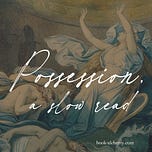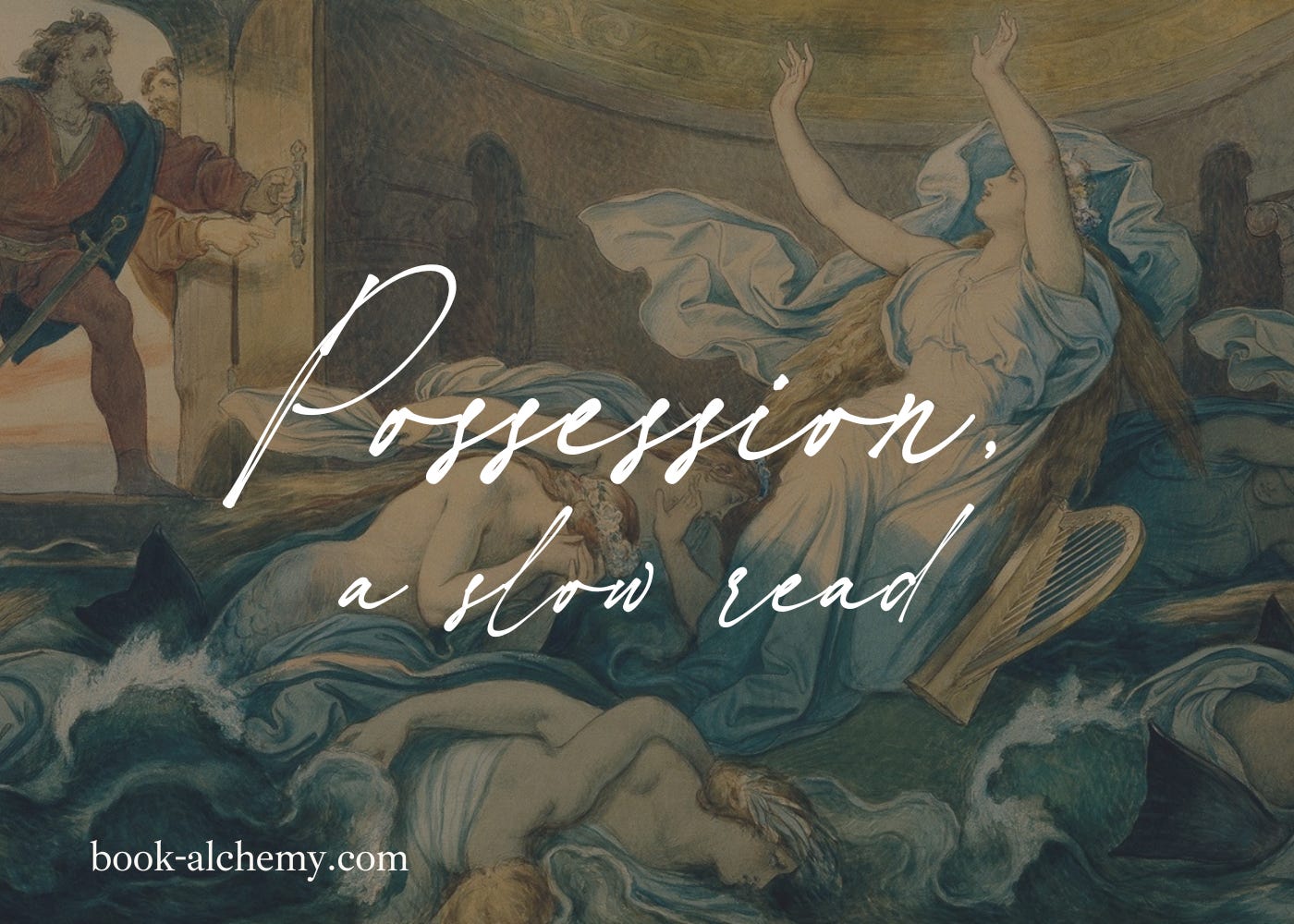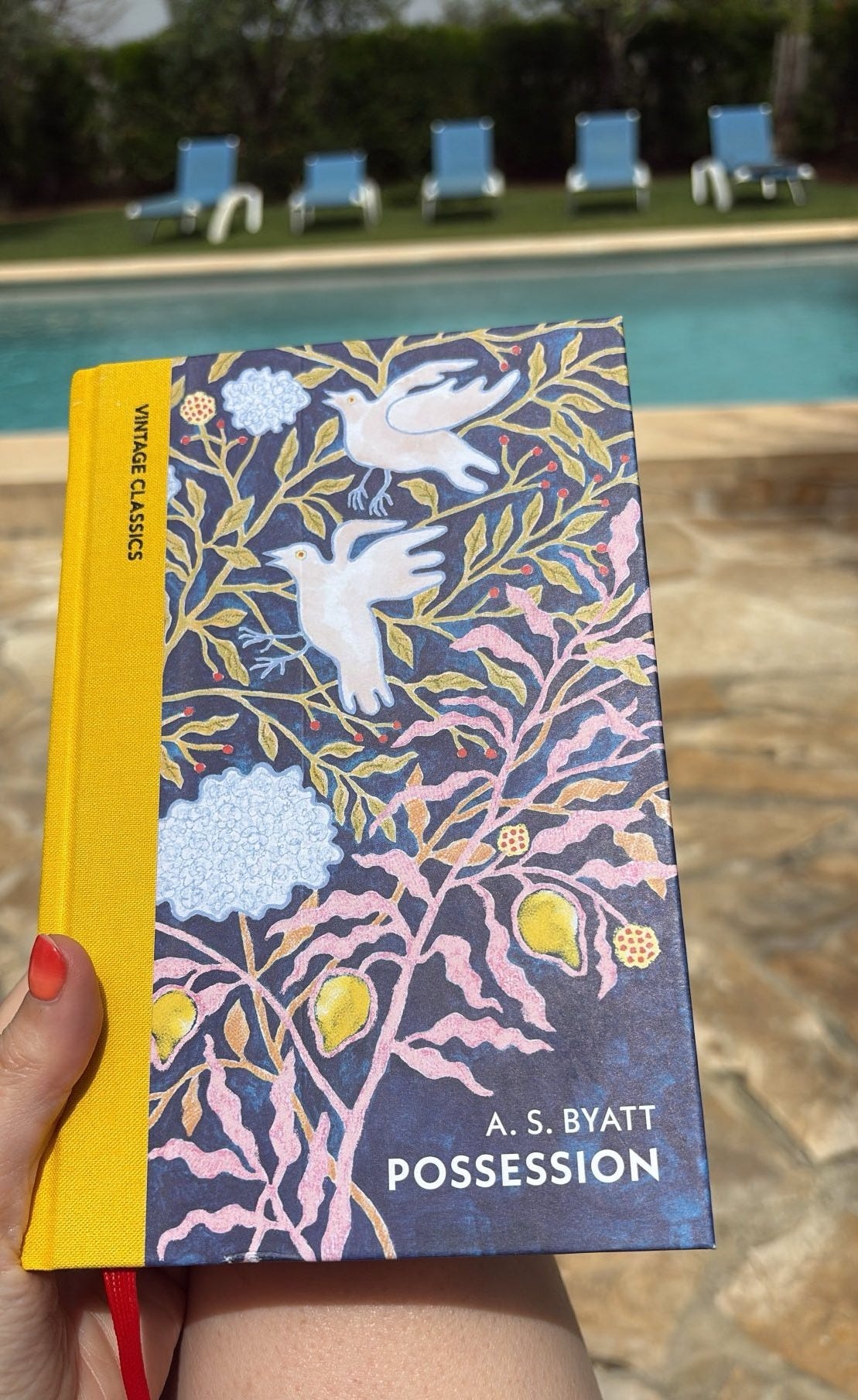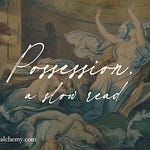To read this week: to partway through Chapter Four, just before the heading “A Journal of Our Home Life.”
In the Penguin Vintage edition, this is page 49.
We begin our first section of reading today. Next week’s post will cover the pages we read this week. I always prefer to dive into comments and reflections after I read the assigned pages in a slow read so I can form my own impressions first.
This week’s podcast covers:
The slow reading practices I follow
A. S. Byatt’s introduction
Possession as an ideal candidate for slow reading
Going forward, you’ll receive a weekly podcast debrief of the reading, which will also appear as a written post if you prefer reading to listening.
This week’s post is free to listen to (or read below), but moving forward all slow read content is for paid members only. Listening today will give you a taste to help you decide if you want to join us at the last minute. (I hope you do!)
Welcome to Book (& Craft) Alchemy’s Slow Reads.
I'm Caroline Donahue, and I have been writing here for several years, but it was time for a new chapter, and now we're beginning this new adventure together with a slow read of Possession. I have been feeling the pull of this book for quite some time, actually.
I read it several decades ago in my twenties and loved it, but was relatively fresh in my writing journey, and I don't think I fully understood the incredible amount of work and brilliance that was required to create this book.
Over the past months, I felt an increasingly powerful tug on my metaphorical sleeve to return to Possession.
I found a beautiful hardback copy, and I took it with me on a holiday and read it in a matter of days. It's a big book. I know you all know this if you're planning to join because you will have gotten your beefy copies ready.
It was a big book to get through that fast, but I could not resist its pull. This was when I thought about it as an excellent candidate for a slow read. When we read books we love, we can't help but read them quickly.
I always say to my students and my clients that good craft is invisible.
Because it doesn't obstruct our view of the story itself, and there was certainly no obstruction. As I hurdled through this story for a second time this past May, and since then I have really been in its grasp, and this is for several reasons. I was pulled by the T.S. Eliot line from his poem, “East Coker,” 1 which says,
“In order to possess what you do not possess,
You must go by the way of dispossession.”
This struck me as I reread Possession because there is a lot that we are used to seeing in books nowadays that is not present. And which some of us have begun to let go of deliberately.
What I'm talking about is technology and incessant connectiveness in the digital world. This book is a dual-timeline story, but the contemporary storyline takes place in the 1980s.
No one has a smartphone.
People are taking notes on index cards. They're waiting for letters and phone calls. Phone calls are expensive. They're sending things by fax. There's much more resistance to communication pinging between characters, and as a result, tension builds. This lack of instant messaging felt very delicious to me to read, particularly on a holiday where I was trying to disconnect from the digital world as well.
In addition, this book exists outside of multiple rules that anyone writing today has learned are “necessary” in fiction. We'll be going through those rules as we read and as they become relevant.
The first one I can think of that's the most obvious is:
I cannot imagine a book being published today with poets from the 1800s that included full-length works of poetry by these characters that were presented for the reader. I cannot imagine this being permitted. In my initial read of the book, I thought of this as, “Ah, look, publishing in the 90s, there was so much that was allowed.”
In A.S. Byatt's introduction she definitely popped that balloon for me. She writes about, the feeling that she has crossed some lines for publishing:
“When the book was finished, publishers on both sides of the Atlantic were dubious. They begged me to cut out the poetry, to cut down the Victorian writing. ‘You have ruined a nice intrigue with these excrescences’, said the only American publisher brave enough to take it. I wept in the early mornings. Then it won the Irish Times Aer Lingus Prize and the Booker Prize. And to everyone's astonishment — including my own — became a bestseller. People write these on my imagined poets. It is translated into over 30 languages.”
How fortunate we are that she stood her ground. I wonder if there are authors today who don't stand their ground or feel it's impossible to stand their ground and to follow the thread of the story as it exists in their imaginations.
The publishing and entertainment industries now feel so much less willing to take a risk. They feel scared and uncertain and hopeful, in some cases, to improve the vast underrepresentation of a majority of the population that has been going on for centuries. And yet, they're often unwilling to take a risk on a story that is unexpected.
This book, Possession, I find profoundly unexpected, especially reading it today. A. S. Byatt describes how it came to exist in the introduction, and she says, “Unlike anything else I have written. It began with a title.”
I love hearing this because titles are hard and I have struggled with titles myself and to know that it was there from the beginning and that she had an image of academics possessed by a figure, a poetic figure that they had chosen.
Depending on the academic, there are different figures who play these roles in the book, but also those original poets possessed by imagery, possessed by language. And what does this mean? What do we want to be possessed by now? What is the most significant relationship we can have with art, with writing, with story?
What do we hope for as readers? I think all of us hope to be possessed. It is interesting because a lot of people describe this book when I read about it in contemporary publications, as a comedy or a farce or a critique of academia, and it does critique academic culture, but the overall feeling I had when reading, it was far moodier and far more atmospheric than a mere farce.
Describing it as a comedy, even though there are moments that are very funny, has never sat well with me. I was quite relieved when recently author Charlie Jane Anders wrote an article in Lit Hub2 describing Possession as the book that paved the way for the dark academic genre.
It was, as Anders Points out, published two years before The Secret History, which is another book that I love, and another book with that same thick academic atmosphere that has spawned fashion choices, ways of being, love of the autumn, and many other details which resonate strongly at book alchemy.
But I feel that this assessment of Possession as its own way of thinking about academic pursuit, less extreme that some of the dark academic books we see now, is apt. There is no actual magic. There is no magic school. However, there is a hunt. There is a search, and A.S. Byatt describes being grateful to Umberto Eco’s In the Name of the Rose, another historical novel with a search at its heart, that had gripped readers around the time that she started writing Possession. Byatt expresses her gratitude to Eco, giving her a way of framing the fact that you could write a literary novel that had a mystery at the center, which is another thing I love about Possession.
It is not jumping into private jets and flying around the world or flying on Pegasuses, — I never know what the plural is of Pegasus, to be honest — or some other dramatic way of traveling. As Anders points out, there's a lot of lukewarm tea, frayed hems and damp basements, particularly with Roland's apartment.
There isn't the glamor that we've come to associate or luxury in terms of accommodations or old towers at a university. Although they're there, they're expressed differently. But that doesn't mean it doesn't have this atmosphere of exalted feelings about learning. And as Anders writes,
“The real luxury, in Possession, is eloquence and insight: absolutely everyone, even the non-academic characters, speaks in gorgeous literary allusions and thinks deeply about the meaning of stories—even, perhaps especially, the characters who insist that they don’t care about such things. Possession makes book nerdery seem glamorous and sexy.”
I must say, I have always found book nerdery, glamorous and sexy, no matter how frayed the bathrobe is, no matter how chipped the teacup; simply being able to immerse oneself in a story fully has always felt luxurious, delicious and magical to me, and that is what we're going to be doing over the coming months.
We're going to be exploring this book as an artifact, and not just an artifact of the time in which it was written, but how we relate to it and its reflection of its time today. How this inspires us and can make us ask questions as writers, how we can think about our own stories and perhaps gives ourselves more permission to take bigger risks in our own writing.
How I approach Slow Reads
There are a number of people highly qualified, doing an excellent job, offering slow reads on Substack and elsewhere. I admire many of them and have taken part in many of their slow reads. The first one I ever did was War and Peace with Yiyun Li of
before it came to Substack. I've done the Wolf Crawl with Simon Haisell of and read Middlemarch with and have enjoyed these slow reads immensely.The benefit of starting my own now is that I get to learn from what I've loved about their work, but also to bring my experience and sensibility to the process. Unlike many of the people offering slow reads, I am not an academic in literature.
What I have is a background in analyzing art and in thinking about the way our minds engage with it that has come from studying art history for my undergraduate degree.
I will be bringing in a lot of references to historical details and art, both of which come up throughout this book. I went on to do my master's in psychology and Expressive Arts: the way that the creative process functions, the way that we write, the way that we're inspired by imagery. The way we connect to story as humans is incredibly significant and was a big part of my study. Looking at this story as a symbol or a code that we can engage with as humans who make meaning through story is a practice that I really look forward to sharing with you.
Today, September 1st we begin reading.
Hopefully you have your copy of the book already, but there's still time to catch up because the weekly reading is meant to be extremely manageable.
The way this is going to work is that every Monday you will get a reading debrief like this one, both as a podcast episode, which you'll be able to subscribe to and listen to, or if you prefer to read, it will be formatted just like this one was, as a post.
We’ll start sharing thoughts on our first section of reading next Monday.
You will read first and then the debrief will come on the first day of our next week of reading. This is so you have time to read and form your own opinions and your own thoughts. This is not historical fiction, so all of the facts of the story are not out there in public.
I want to preserve everyone's experience reading and so this is why I prefer the format of sharing the reading debrief at the end of the week of reading.
There's a link below this post to the reading schedule post, and it has been made so that you can use any edition of possession. I've tried to make it really simple so that you can find whatever copy suits you.
I've heard from many people finding use copies, copies and charity shops, and this makes me really happy as it's one benefit of reading an older book that is not exactly a classic, but I think. We could make it one.
I invite you, if you're not listening to this already signed up to join us, we will have discussions about our reading starting from next Monday once we finish the first section, and to build our relationships to a truly, truly rich and delightful cast of characters that have been living inside my mind for months now and years ever since I first read the book. I expect you will have the same experience.
If you're not yet a member and joining us, I encourage you to sign up today. Let's build a beautiful space that we can enjoy and give ourselves a gift this year of immersing ourselves in story. I can't wait to begin. Happy reading, and I'll be back next week with our first debrief.
Thank you for being here.
Welcome to Book (& Craft) Alchemy’s Slow Reads.
A few words on how we’ll keep this a safe space:
When we open commenting for the previous week’s pages, please confine your comments to the pages we’ve just read or those before that point. NO SPOILERS if you’ve read the book before. This novel has some twists and a mystery running through it. Any comments that break this rule will be deleted.
Please also comment and discuss with a spirit of kindness. Everyone here loves books and reading, but everyone here is a unique human with a whole life around them. People’s opinions about characters, events, and favorite passages will differ. Please confine your commenting to your own thoughts. If anyone posts comments that criticize another participant’s reading, they will be removed.
Bottom line: comment and discuss as you’d like people to write to you. It’s a rough world out there, and I built this space to be a refuge. It will be moderated to maintain that safety.
If you’ve read (or listened) this far, and aren’t yet a paid member, now’s the time to upgrade your membership to continue on with us.
** Special thanks to Emily Hawkins, my friend who composed our beautiful theme music, for taking this project in the midst of a VERY busy summer composing for TV and film, and rushing around the world for various projects and awards, all well earned.
T.S. Eliot, “East Coker,” Four Quartets, Faber & Faber, 2001.
https://lithub.com/charlie-jane-anders-on-how-a-s-byatts-possession-paved-the-way-for-dark-academia/












